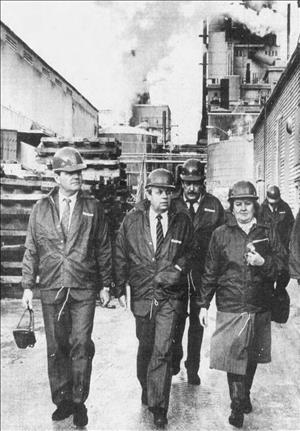Ross N. Lavroff served as the "voice" of the historic 1975 Apollo-Soyuz docking among other assignments as an interpreter. The Ukraine-born Russian served numerous U.S. government and international agencies.
Refugee from Stalin and Hitler
Ross Lavroff was born in Kiev on April 29, 1936. His father disappeared during the Stalinist purges of the 1930s, and German invaders captured his family in 1942. Lavroff's older sister, Vera, was conscripted into Nazi war industries and deported to Polish and German factories, and Lavroff and his mother were deported with her.
Following liberation in Germany, Vera married an American soldier and in 1950 moved to Rochester, New York, with her brother. Lavroff displayed an early talent for languages, graduated high school a year early, and attended the University of Rochester. After gaining U.S. citizenship in 1955, he enlisted in the Army. He became enamored of the Pacific Northwest during a posting at Fort Lewis, near Tacoma, Washington.
Voice of Presidents and Cosmonauts
Lavroff served as a simultaneous interpreter for NBC during Soviet Premier Nikita Khrushchev's visit to the United Nations' New York City headquarters in 1961. Over the next three decades, he was employed by a variety of international groups and agencies, ranging from the U.S. State Department to the Bolshoi Ballet. Among notable moments in his career, Lavroff served as an interpreter to Presidents Ford, Carter, and George H. W. Bush in high level meetings on nuclear disarmament and other topics. He was proudest of his work for NASA as the public simultaneous interpreter for U.S. and Soviet crews during the historic July 17, 1975, docking of Apollo and Soyuz spacecraft.
In his private life, Lavroff was a dedicated denizen of Seattle's Lake Union houseboat community, a friend of artists and poets around the world, and a regular of the Blue Moon Tavern, where he delighted in hosting high-level Soviet officials and their nervous KGB escorts. During a 1987 session in the Kremlin, Soviet President Mikhail Gorbachev once teased Lavroff, "So you're from Seattle. How's the Blue Moon?"
Stranded by History?
In 1990, Lavroff befriended a crew of Russian sailors stranded in Seattle by the collapse of the Soviet Union. The sailors had been retracing explorer Vitus Bering's route in three replicas of his ships. Lavroff found sponsors and lodging for them, and orchestrated an elaborate ceremony on Lake Union in which they struck the Hammer & Sickle ensign and ran up the Imperial Russian flag in its place, which earned national publicity.
Lavroff also served as a technical adviser to Alan Furst on his first novels, offering details on Eastern European history and security agencies. (Furst, best-selling author of spy thrillers set in Eastern Europe, lived on Bainbridge Island, near Seattle, in the 1980s.)
Lavroff underwent heart surgery in 1987 and was in semi-retirement at the time of his death. The fall of the Soviet Union was bitter-sweet for Lavroff. Although continuing to be active in mutual U.S.-Russian weapons-destruction talks, he found himself increasingly displaced by free-lance Russian interpreters, whom he liked even less than their Communist predecessors. He remained busy with highly technical translation work for U.S. and Russian groups and businesses up to his death on March 30, 2001.

